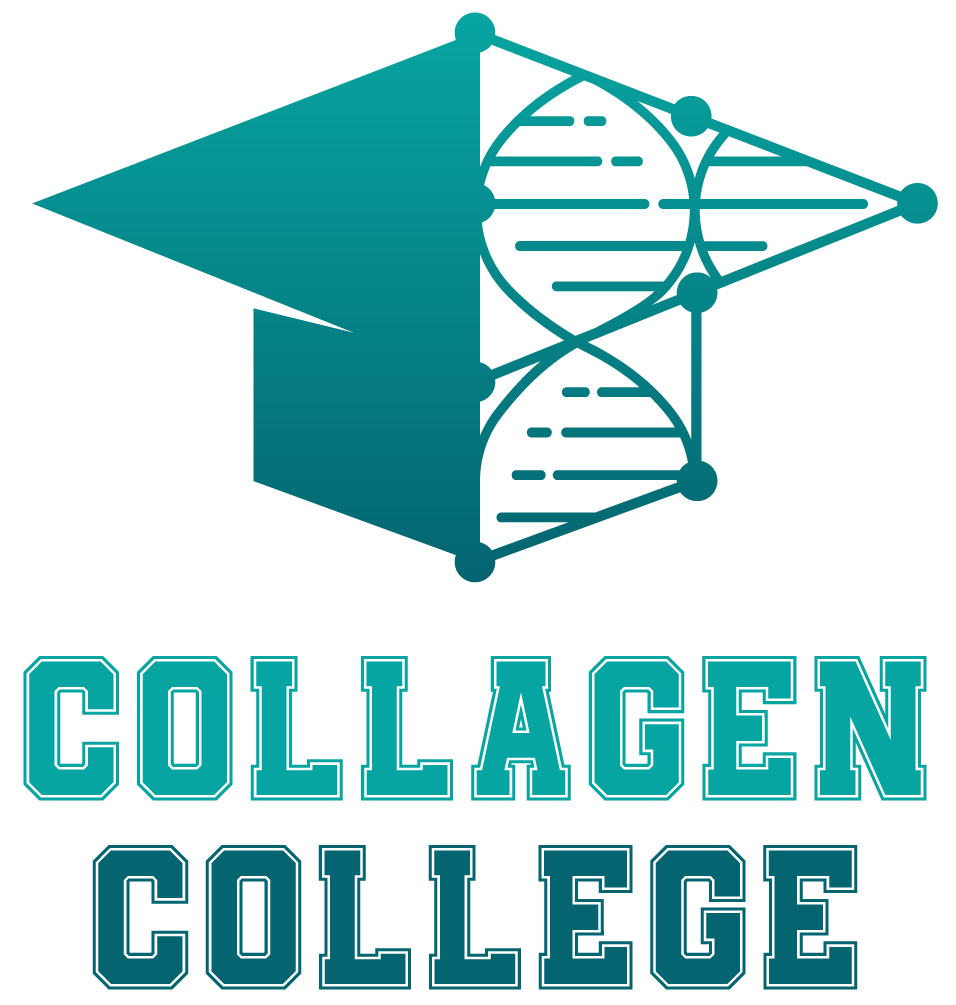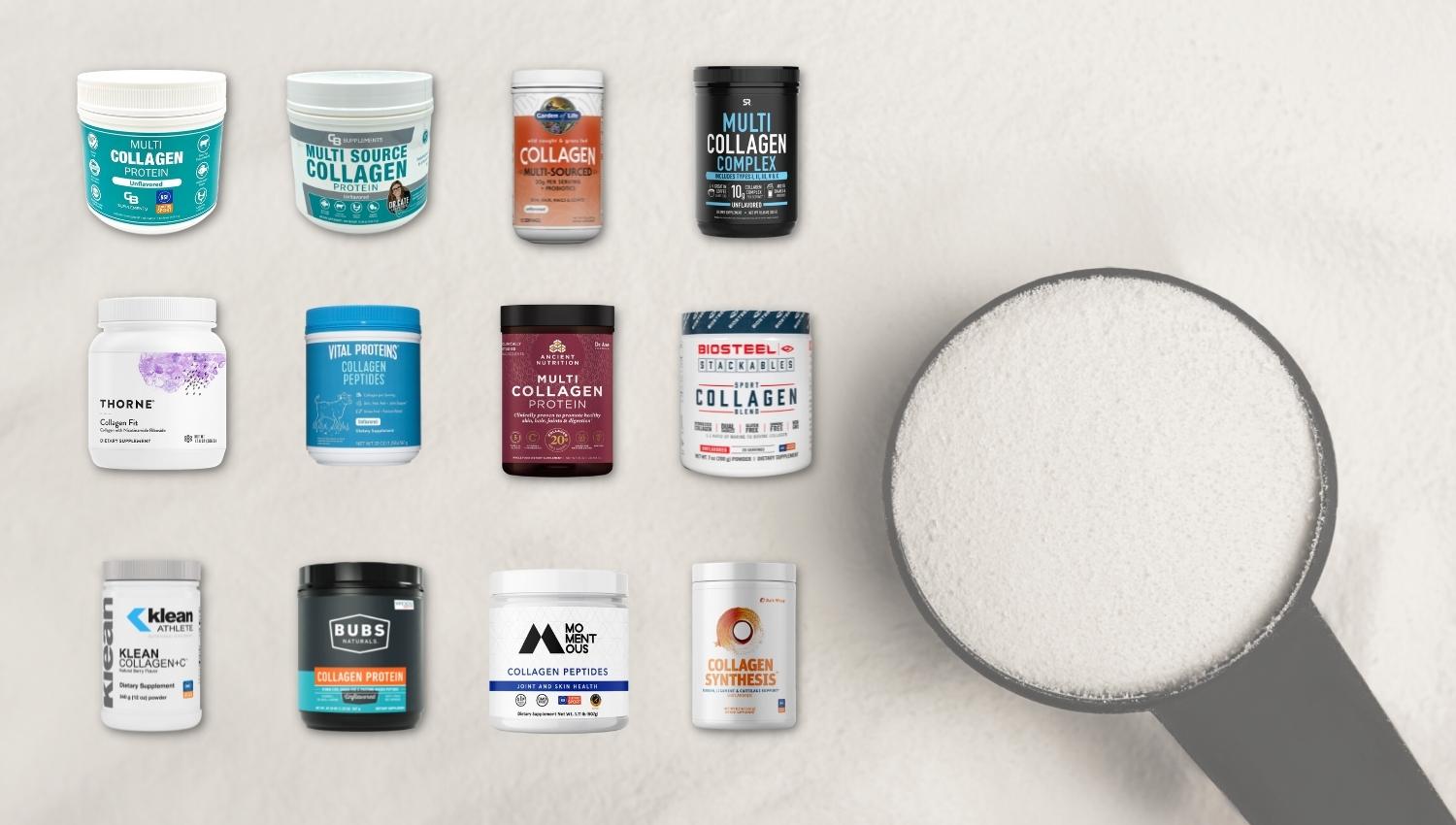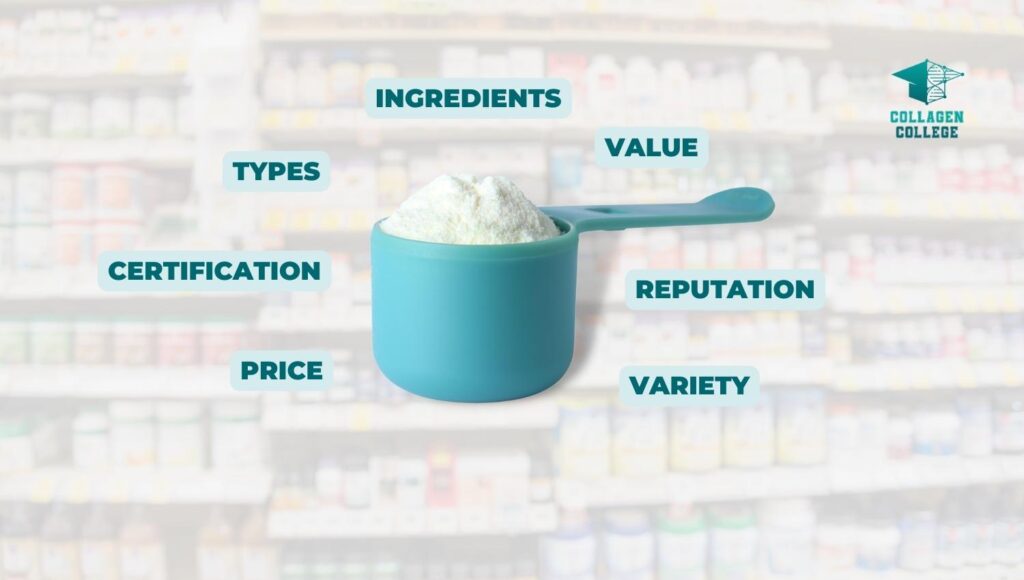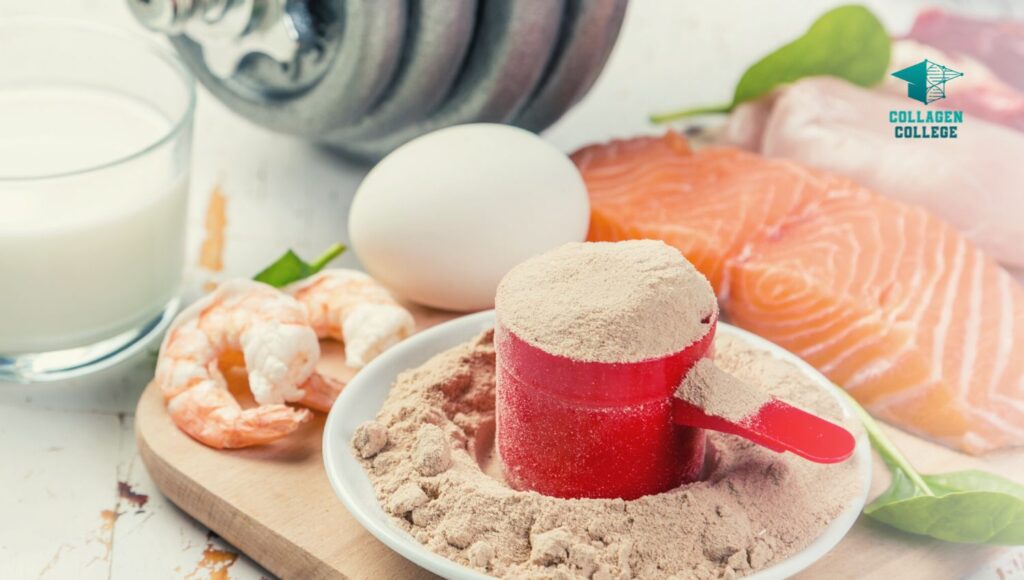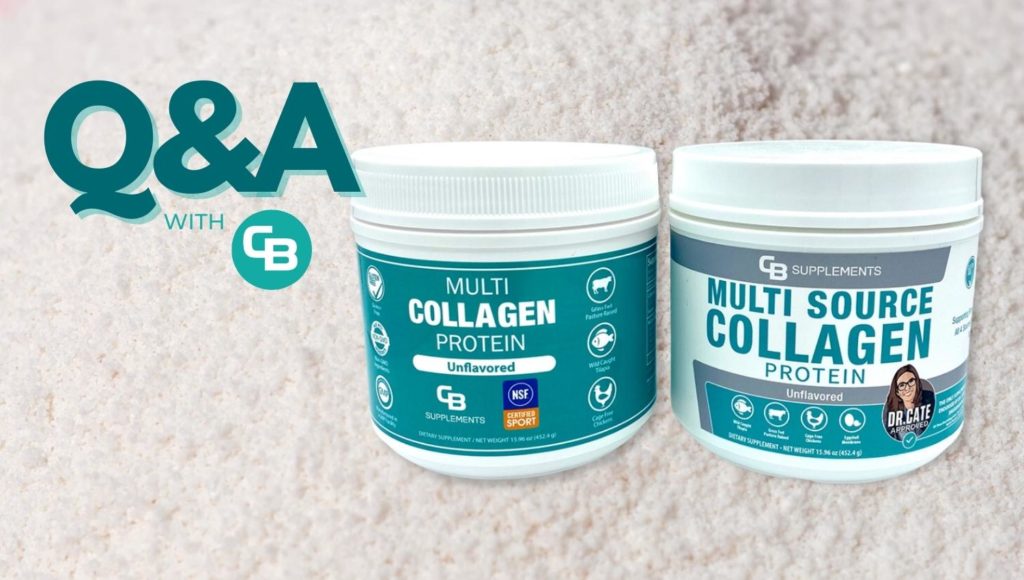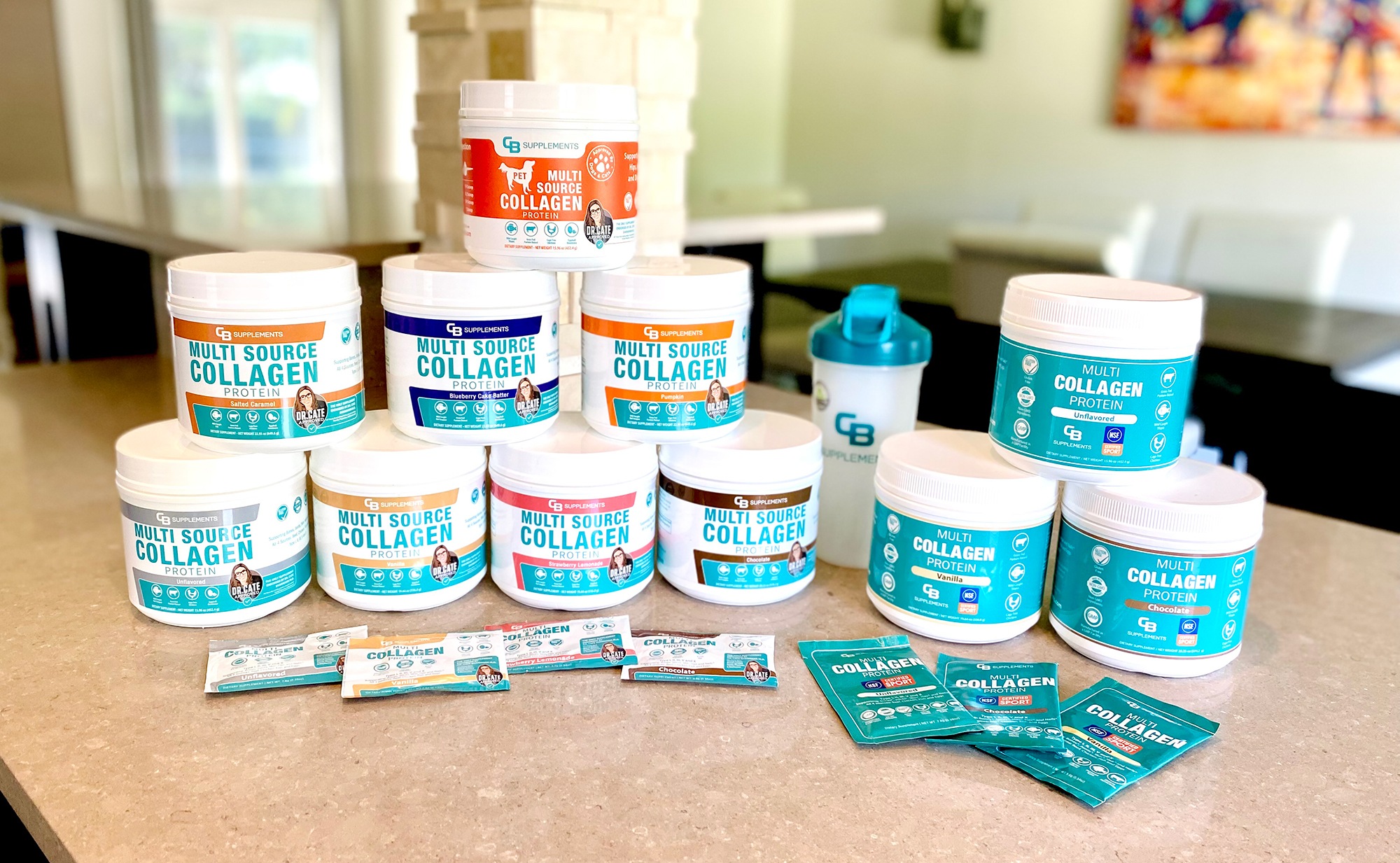We get this question often:
Other collagen brands have 100% DV Vitamin C since it improves collagen absorption. Is this addressed in your formulation or do you have reasoning behind why not to include it?
— Michelle
As Michelle noticed, and probably you too, many collagen supplement powders add synthetic vitamin c to their products. See our collagen powder comparison and you’ll find several brands add in vitamins, minerals, and probiotics. This is a wildly popular trend in the collagen world, and the topic itself (adding “extra stuff” to a collagen supplement) can confuse consumers quickly.
With that said, this topic — vitamin C and collagen — transcends supplement comparisons. It’s a fundamental science and deserves better understanding in general.
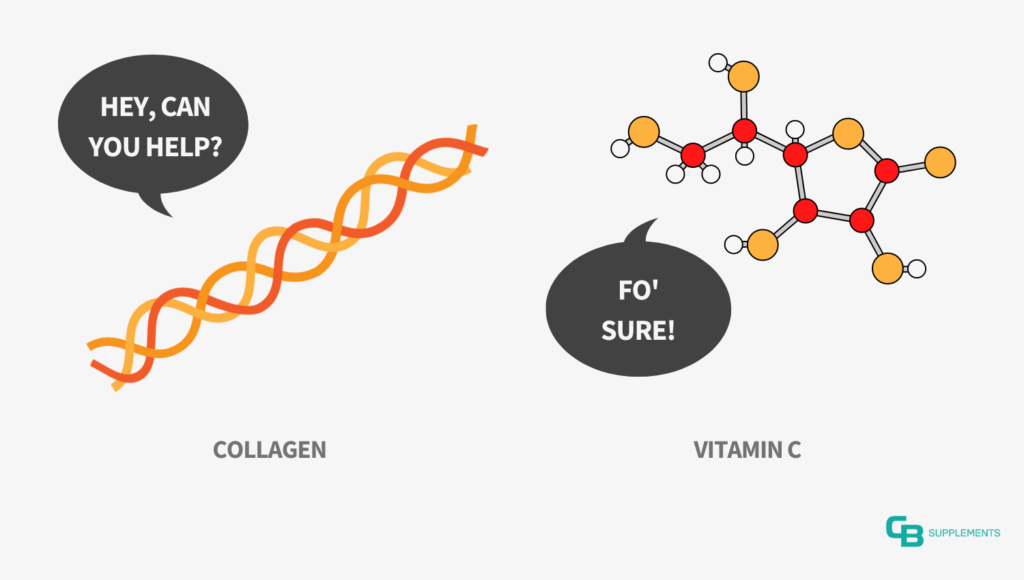
What you’ll learn here
We’re here to present the real facts and fiction with the help of Dr. Cate, M.D. — our in-house scientist — about the relationship between vitamin c and collagen. We’ll share the real science, nutrition, and biology of vitamin c and its actual role within collagen protein, synthesis, and supplements.
Along the way, you’ll also see us methodically answer Michelle’s question of why we don’t add vitamin c to our multi collagen complex. All this will help you become a more informed collagen supplement consumer.
Let’s start with the basics of vitamin c.
Vitamin C 101
Vitamin C (Vit C), also known as ascorbic acid, was one of the first vitamins isolated and discovered back in the early 1920s. Can you guess which vitamins came before C? That’s right, A and B. 🙂
Vitamin C is an antioxidant and necessary for the growth, development, and repair of all body tissues including blood vessels, cartilage, muscle, and collagen in bones. It’s popular in multivitamins, supplements, and over-the-counter cold medications — who hasn’t wanted to blast their sick bodies with a crap load of synthetic vitamin c!
[raises hand discreetly]
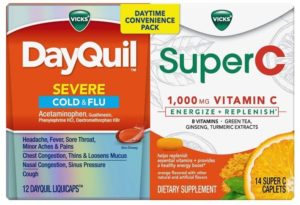
RDA
The RDA (recommended daily allowance) is a guideline for how much C we need, and most references will suggest the following:
- Men = 90mg
- Women = 75mg
Deficiency
Now that we know a general baseline for how much vitamin c our bodies need, what’s the data say about whether we’re getting enough? Do we need to put our vitamin c intake on watch?
The data says, “Relax, you’re OK.” Only 1 in 20 are vitamin c deficient. Deficiency is there for smokers, certain GI or cancer conditions, or those with a diet void of fruits and vegetables.
Food vs Supplement

Since our bodies can’t make Vitamin C, we must eat it. But, is it better to get vitamin C from food or a supplement? You probably already know the answer to this. 100%DV is easily obtainable — unless you’re eating Oreos all day erryday. As a quick reference, you can typically obtain 100%DV of vitamin c through:
- 1 cup of chopped bell peppers [see facts]
- 1 cup of broccoli [see facts]
- 1 whole navel orange
- 1 cup of strawberries
Vitamin C from food is more natural and more useful because synthetic vitamins often contain isomers as a byproduct of the manufacturing. Isomers are like chemical imposters that can block the ability of the vitamin in question to function.
Scurvy disease helped us understand collagen
We’ve come to learn about vitamins quite well since their discovery in the early 1900s. But, let’s back up 3 centuries.
The knowledge about vitamin c was expedited mainly because of Scurvy — a deficiency in vitamin c. This disease was first discovered by sailors in the 1740s. Since their voyages lasted 10-12 weeks, their diets were void of vitamin c foods (which collagen needs, as you’ll find out) which caused anemia, bleeding gums, bruising, poor wound healing, and even killed 2 million sailors between the 16th and 18th centuries.

So, how is scurvy exactly connected to this vitamin c and collagen conversation?
- Scurvy’s impact on arteries (which are made of collagen) was an unfortunate catalyst for our discovery and knowledge of vitamin c.
- Once a scientific connection was made between arteries, collagen, and vitamin c — it helped with the understanding of vitamin c’s role in collagen synthesis.
- We now know more about vitamin c’s role with collagen than any other vitamin!
Quick Review of Vit C
- Vit C was one of the first vitamins discovered over a century ago.
- Vit C can be found in multivitamins, supplements, and over-the-counter drugs.
- Most of us are not C deficient, we get 100%DV from our diet. Choose food over supplements!
- The disease, Scurvy, helped us understand vit C better, and now science knows more about how vit C impacts collagen synthesis than any other vitamin.
Vitamin C & Collagen Intro
Alright, time for our in-house mad scientist, Dr. Cate, M.D., to jump in and help us get scientific.
(She’s actually never mad, quite pleasant on the contrary.)
Dr. Cate is not only a mad scientist but also a biochemist and medical doctor. She’s helped us research, understand, and fact-check how vitamin C impacts collagen production and synthesis. Time to separate fact from falsehood.
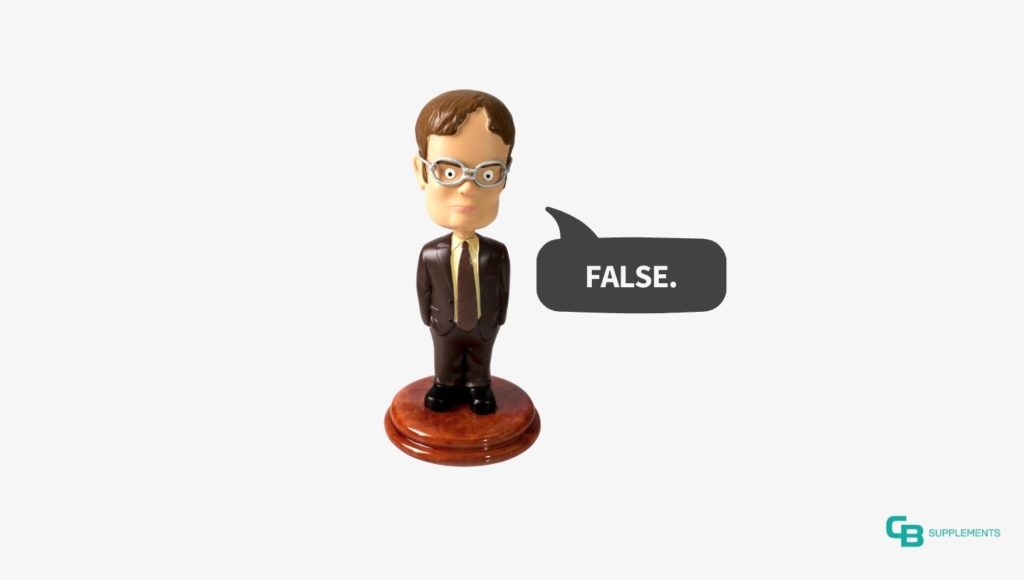
Does Vitamin C help produce collagen?
Yes, but it’s not the only vitamin needed.
Vitamin C is a critical piece to collagen synthesis/production and does help build collagen. However, nearly every vitamin is needed for collagen synthesis! Optimizing a complex process like stimulating fibroblast cells — more on fibroblasts below — to make more collagen in all your collagenous tissues requires just about every nutrient there is.
We have scientific studies from the early 20th century proving that vitamin c helps collagen production. This data can be found in every basic physiology book known to man, such as the Textbook of Biochemistry with Clinical Correlations by Thomas M. Delvin. There’s no scientific debate here, this is a slam dunk, folks.
Why does Vitamin C get more hype than other Vitamins?
It seems like vitamin c gets most, if not all, of the attention when it comes to collagen. But, why?
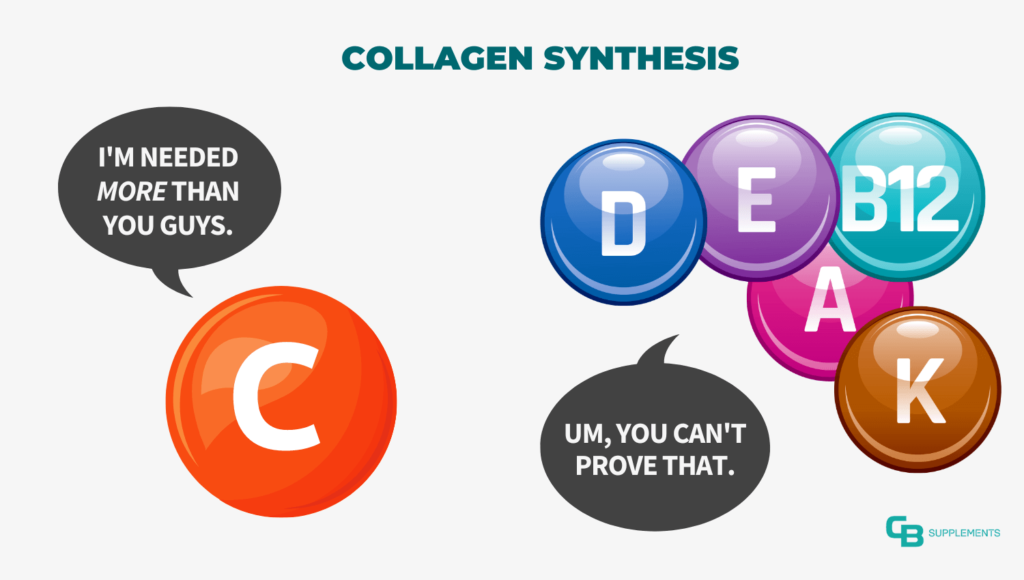
Why don’t we hear chatter around Vitamin A, B, K2, or others and those vitamins impact on collagen production.
Scurvy.
This aforementioned disease required significant research on vitamin c. And though we know much about vitamins, we don’t necessarily know how other vitamins impact collagen synthesis. We don’t have the research, and therefore the data.
Which Amino Acids in Collagen are most reliant on Vitamin C?
Vitamin C helps turn the amino acids proline and lysine into the modified amino acids hydroxyproline and hydroxylysine. These two modified amino acids are unique to collagen.
Without vitamin c, there’s no hydroxyproline or hydroxylysine. Without those two modified amino acids, there’s no collagen.
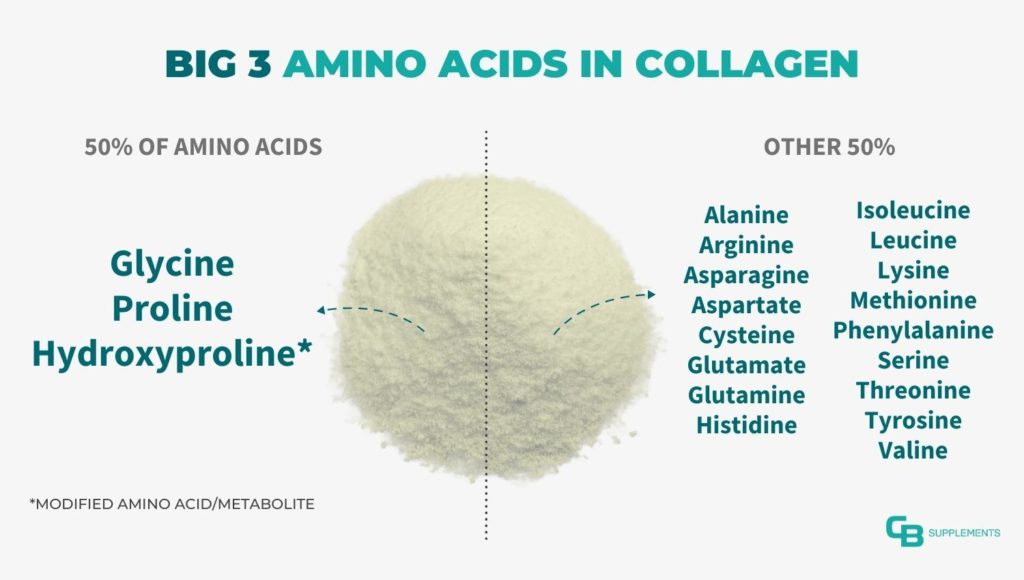
Does Vitamin C stimulate Fibroblasts?
Sort of. There’s a step in-between.
When it comes to the science of collagen production, it’s all about fibroblasts — cells that live in our connective tissue. For fibroblasts to do the heavy lifting of creating more collagen, they need enzymes, and one of those enzymes uses vitamin c. If this process were a flowchart, here’s how it’d look linearly:
- Vitamin C > Enzymes > Fibroblast > Collagen
Do you need extra Vitamin C for Fibroblast stimulation?
As we learned above, since most of us are not vitamin c deficient, these enzymes have what they need to create more collagen.
If you have C in your tissues and all the other vitamins and minerals, the enzymes will function.
— Dr. Cate, M.D.
Do you need Vitamin C to absorb Collagen?
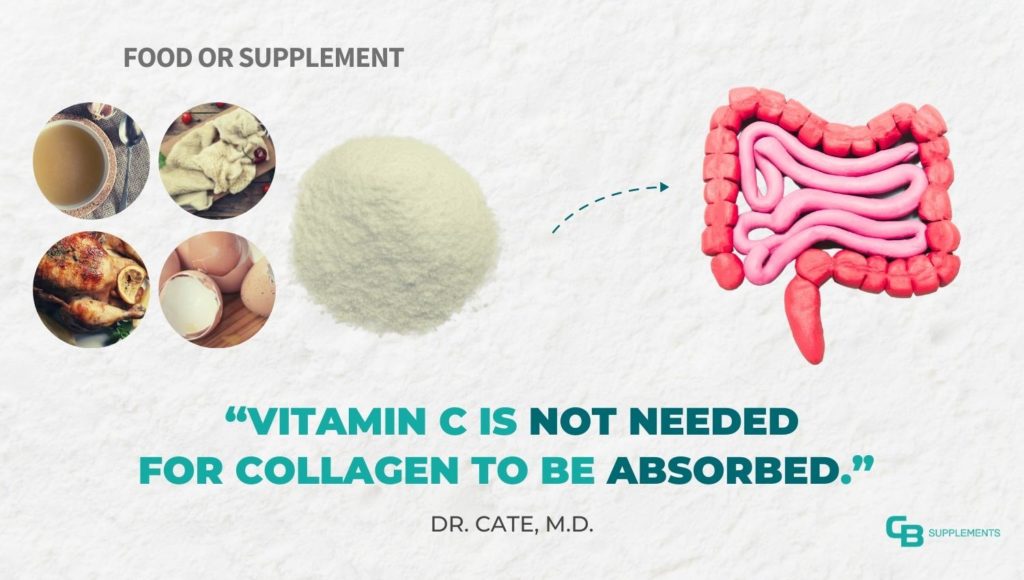
Absorption. Goodness, this specific detail around collagen and C has shifted far and away from science and biology.
No, you do not need vitamin c to absorb collagen. It’s a wild claim to suggest that you can’t absorb collagen without vitamin c. Harbin Clinic defines this nicely:
Absorption occurs when the small intestine breaks down nutrients that are then absorbed into your bloodstream and carried to cells through your body.
— Harbin Clinic
Does your small intestine wait around for vitamin c before it absorbs a scoop of collagen powder with your morning coffee? There’s just no evidence to prove this or anything of that nature.
Instead, we need healthy gut flora and healthy intestinal cells. “Hands down, the fastest way to improve the health of your gut flora and all your intestinal cells is to avoid seed oils (see: Good Fats and Oils vs Bad) and limit your intake of refined flours and sugars”, explains Dr. Cate.
Do you need to consume Collagen and Vitamin C together for maximum effectiveness?
Let’s talk about safety, effectiveness, and timing.
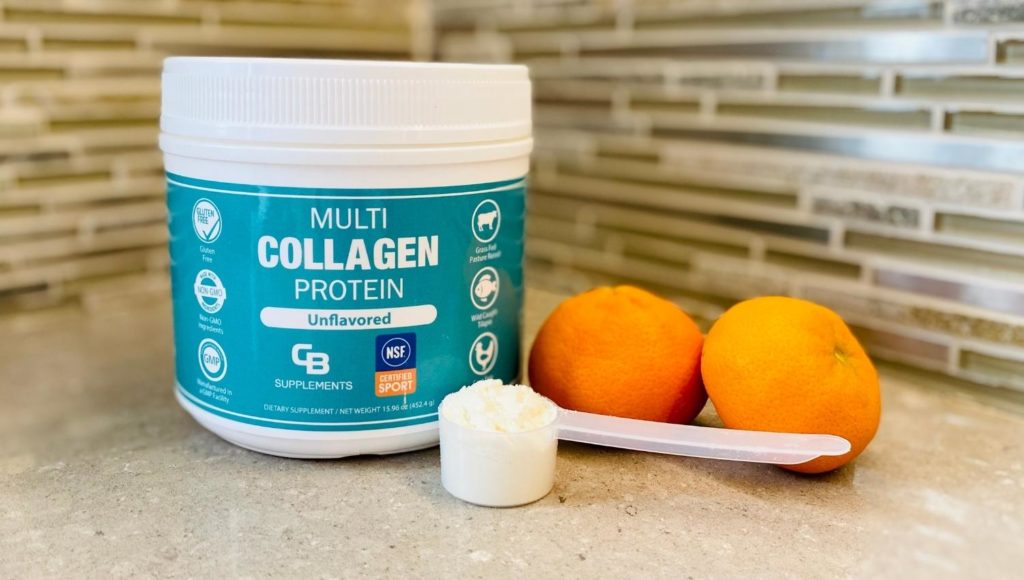
Can you safely take Collagen and Vitamin c?
Yes, you can take collagen and vitamin c together safely. And that’s also true for other vitamins. You can consume collagen and vitamins together safely because collagen is food!
Do you need to combine Collagen & Vitamin C for Maximum Effectiveness?
Let’s not make collagen supplementation hard, folks. No. There’s zero evidence proving you need to consume collagen and vitamin c at the same time for maximum effectiveness. Unless you’re vitamin c deficient, you’ll have C already in your tissues for those enzymes to tap into to start the fibroblast sequence!
There’s no need to consume C with collagen for this system to work. What you need is a well-balanced diet.
— Dr. Cate, M.D.
Here’s your takeaway: You do not have to pair/combine/join/merge your collagen supplementation and vitamin c consumption like this:
- Eating an orange with coffee and collagen
- Adding a vitamin c supplement to a collagen smoothie
- Baking in red peppers to collagen-infused cookies (j/k, gross!)

Is there a best time to take Collagen and Vitamin C?
Let’s start with saying that your body can absorb and put collagen to use at all times of day. So the best time to take collagen is whenever it’s convenient for you. There’s no need to perfectly align your daily collagen and C intake.
You DO NOT have to to do this:
- 7:16 am = add a scoop of collagen powder to coffee, check!
- 8:16 am = wait 1 hour, eat a bowl of tomatoes to obtain 100%DV of vitamin c, check!
- 8:17 am = Start binging old episodes of The Office
But, you certainly can if you wish! No harm, no foul here.
Collagen Supplements with Vitamin C
Let’s circle back to Michelle’s observation at the beginning by briefly exploring how and why brands add vitamin c to their collagen supplement.

How much Vitamin C is typically added?
Collagen powders that add vitamin c will include anywhere from 50mg to 90mg of Vitamin C per serving (1 scoop). Hyaluronic Acid is another popular additive to pair with synthetic vitamin c. As we learned earlier, 90mg would give someone 100%DV of vitamin c — a fact very much touted on the product packaging.
Safety concerns of adding Vitamin C
Are there dangers of adding vitamin c to collagen powder? We believe so. And so does Dr. Cate. To directly answer Michelle’s question, here are three reasons we don’t include vitamin c in our formula:
- Bioavailability jeopardized. The more you add to a collagen supplement, the more uncontrolled chemical reactions can take place during storage, thus reducing the bioavailability of all nutrients involved.
- Amino acids could be damaged. As an example of point #1 (harming bioavailability), vitamin c, an antioxidant, can also act as a pro-oxidant and oxidize collagen’s amino acids during storage.
- Too much C is dangerous. Excess supplemental C could turn into a dangerous form of oxygen and cause diarrhea, nausea, vomiting, and more. How much is too much? It’s different for everybody, but the danger zone could begin as low as 500mg.
Taking 10x the RDA of vitamin C with collagen might be counterproductive.
— Dr. Cate, M.D.
Why do collagen brands add Vitamin C?
If most people don’t need more vitamin C, an excess of C could be dangerous, and adding synthetic C could degrade collagen’s amino acids — why do collagen products do it?
This is the million-dollar question.
We’ve already explored why brands add vitamins and minerals to collagen, but here’s my take when it comes to C, specifically. I believe it’s a combo of “smart” marketing and people just not knowing the truths about:
- Isomers.
- How compounds like C can behave chemically.
- What can happen when you take synthetic C in high doses for an extended time period.
Dr. Cate adds a provoking thought to our million-dollar question. “Since we know collagen synthesis requires nearly every vitamin we have, why stop at vitamin c?”, she suggests. “If you’re going down the road of consuming collagen with synthetic nutrients, why not add every single vitamin and every single mineral?”
Questions to ask yourself

This is a lot of information. We know. But the topic certainly requires it. Here are 3 questions we’d encourage you to be curious about before choosing a collagen supplement with added vitamin c.
- Do you need more vitamin c in your diet? Probably not, but find out for sure by tracking it.
- How much extra C with each serving in your supplement? If you’re already getting 100%DV of vitamin C, and you take a few scoops of collagen every day that adds C, how much extra C are you getting daily? Remember, many collagen powder brands will add ~90mg of C per scoop. Will this excess be dangerous?
- If you are C deficient, do you need to focus on getting it via a collagen supplement? Probably not. Stick with real food. Per Hippocrates, “Let food be thy medicine.”
Let’s not make this collagen thing more complex. Here’s to keeping it real. 🤜
